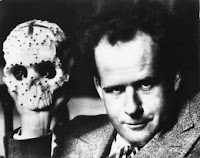And after Psycho, the logical choice is North by Northwest, which has a very different narrative structure, demonstrating that we need to consider the relation of characters' needs to simple cause-effect logic.
rium Friday, 29 April 2011
Narrative and Narration
Psycho (1960)
Dir: Alfred Hitchcock
"No one...BUT NO ONE...will be admitted to the theatre after the start of each performance of PSYCHO."Let's look at CAUSE-EFFECT LOGIC in narrative film: The first three scenes of Psycho reveal the importance of 'narrative logic'. By scene three we have established the cause or motivation that will drive the film. From scene four onwards we will see the effects of Marion's actions (her decision to steal the money).
One fruitful ways to analyse cause-effect logic in narrative film is to imagine the scenes in a different order.
- What would be the effect if Psycho began with scene 3? It's plausible but not logical – we don’t have enough information to understand
Marion - In what ways is scene 3 the direct effect of scenes 1 and 2?
- Is it just a coincidence that the money is shown in the scene immediately after Marion and Sam talk about their inability to get married?
- Why don't we see Marion travelling from the hotel to her office, or from office to home?
- Why don't we see Sam going to the airport?
So what do we mean by ‘narrative’? It refers to WHAT happens or what is depicted in films (as well as novels) while ‘narration’ refers to HOW that narrative is presented to the film spectator.
Friday, 15 April 2011
3 minute film extract analyses
Films we watched today included:
- Trainspotting (1996, Danny Boyle, UK)
- The Dark Knight (2008, Christopher Nolan, US)
- Second Hand Lions (2003, Tim McCanlies US)
- Kill Bill (2003, Quentin Tarantino, US)
- Black Swan(2010, Thomas Leroy US)
- Just Go With It (2011, Dennis Dugan, US)
- The Tourist (2010, Florian Henckel US)
- Scoop (2006, Woody Allen, US/UK)
- Cleopatra (1963, Joseph L. Mankiewicz, US)
- Star Wars Episode V: The Empire Strikes Back (1980, Irvin Kershner, US)
Friday, 8 April 2011
Lesson 11 - Formalist- and Realist-styles of film-making
Homework for next Thursday: Select 2 clips from 2 different films (from 2 different countries) to illustrate your ideas – be ready to give a 5-10 minute talk based on your clips and how and why they illustrate the main features of a formalist or realist film.
Groups:
Formalists: Jimmy and Diego; Cristina and Deborah
Formalists: Jimmy and Diego; Cristina and Deborah
Realists: Ximena and Yoko; Oscar and Alfredo
Some questions to consider before your talk:
1) What are realistic films supposed to reproduce?
2) Why are formalist films stylistically flamboyant?
3) Why are formalist directors referred to as expressionists?
4) Why would realists be more concerned with psychological truths?
2) Why are formalist films stylistically flamboyant?
3) Why are formalist directors referred to as expressionists?
4) Why would realists be more concerned with psychological truths?
Saturday, 2 April 2011
Textual Analysis of Michel Gondry Levi's commercial - 31st March
Remember to write up your TEXTUAL ANALYSIS of Michel Gondry's Levi's commercial using the WHAT; WHY; HOW formula (see below) and publish it on your BLOG - as well as publishing your Hollywood studio work and one entry for your PRODUCTION JOURNAL. You should also select a 2-minute sequence from a favourite film which you will talk about in class.
TEXTUAL ANALYSIS CHECKLIST
What do you need to think about when you look at a still photo?
Overall composition - framing of shot
Camera angle
Lighting, shade, and colour
Location - where was it shot
Target audience
What other elements do you need to include for an analysis of a moving film sequence?
Camera shots, movement (mise-en-shot)
Editing and sequencing (mise-en-shot)
Sound - diagetic or non-diagetic (mise-en-shot)
Location and set design (mise-en-scene)
Features determining film genre e.g. horror, thriller
For longer sequences:Representation of character and issues
Context:Construction according to narrative and other formal organising principles
Possible historical, economic socio-cultural and institutional factors
Sequence of tasks for any textual analysis of a film:
What is being seen and heard?
Why was it made that way?
How are things such as character mood and ideas constructed?
Barney Elliott - Markham College Film Masterclass - 7th April
The first in the Film Masterclass series will be held in the Music Room and will be by invitation only. The audience will be ALL of you IB Film students as well as potential film students primarily from S4.
Date: Duration:
Content of Masterclass: Barney will talk about the scripting, filming and post-production of his two recent short films: True Colors (shot in
Subscribe to:
Comments (Atom)

